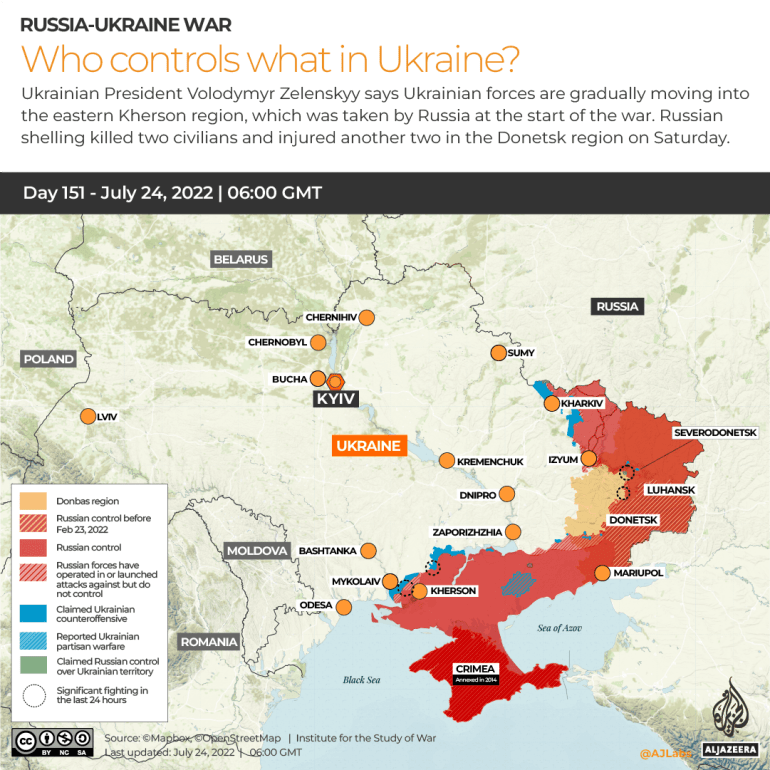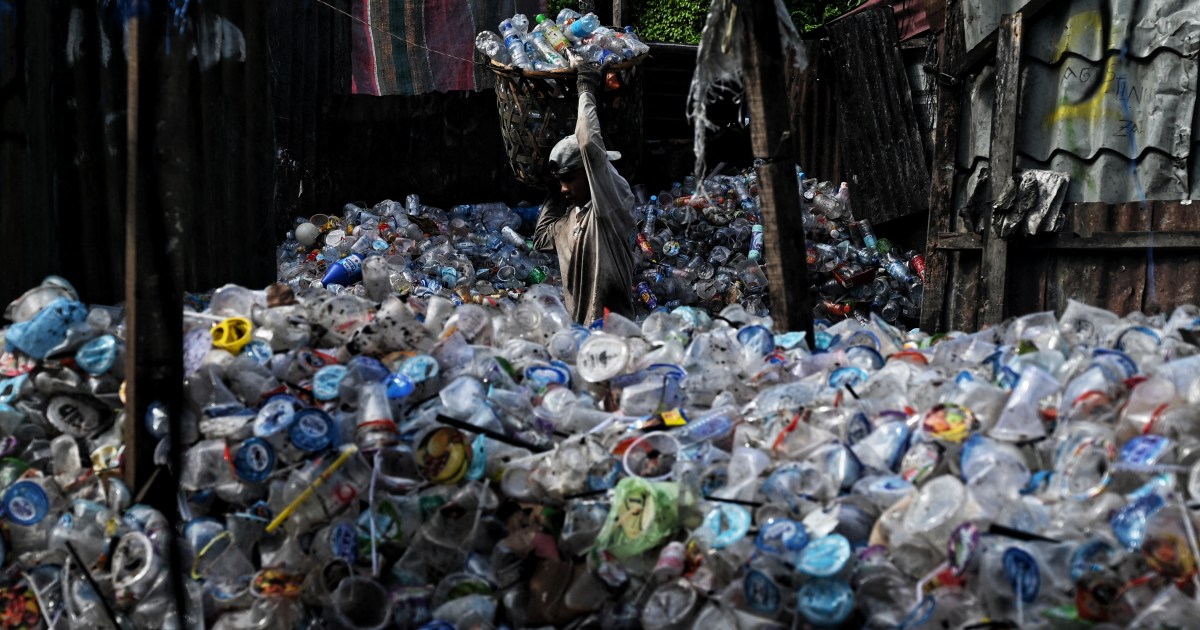Russia says attack on Ukrainian port only hit military targets
Russian defence ministry officials have said that an attack on the port of Odesa – less than a day after Russia and Ukraine signed an agreement on resuming grain shipments from the port – only hit military targets.
“In the seaport in the city of Odesa, on the territory of a shipyard, sea-based high-precision long-range missiles destroyed a docked Ukrainian warship and a warehouse with Harpoon anti-ship missiles supplied by the US to the Kyiv regime,” ministry spokesman Igor Konashenkov said at a daily briefing on Sunday.
“A Ukrainian army repair and upgrade plant has also been put out of order,” the ministry said in a statement on Telegram.
Earlier on Sunday, Russia’s foreign ministry spokeswoman Maria Zakharova said Russian Kalibr missiles destroyed a Ukrainian “patrol boat” in the attack.
Ukrainian President Volodymyr Zelenskyy said in his nightly televised address Saturday evening that the attack on Odesa – one of three designated export hubs under the deal – “destroyed the very possibility” of dialogue with Russia.
The Ukrainian military said on Saturday that Moscow had attacked Odesa’s sea port with four cruise missiles, two of which had been shot down by Ukrainian air defences.
Command spokeswoman Nataliya Humenyuk said that no grain storage facilities were hit. Turkey’s defence minister, however, said he had had reports from Ukrainian authorities that one missile struck a grain silo while another landed nearby, although neither affected loading at Odesa’s docks.
Grain shipments in question
Kyiv said preparations to resume grain shipments were ongoing.
“We continue technical preparations for the launch of exports of agricultural products from our ports,” Infrastructure Minister Oleksandr Kubrakov said in a Facebook post.
It was not immediately clear how the attack would affect plans to resume shipping Ukrainian grain by sea in safe corridors out of three Ukrainian Black Sea ports: Odesa, Chernomorsk and Yuzhny.
The deal signed by Moscow and Kyiv on Friday was hailed as a diplomatic breakthrough that would help curb soaring global food prices by restoring Ukrainian grain shipments to pre-war levels of five million tonnes a month.
Zelenskyy’s economic adviser warned on Sunday the attack on Odesa signalled that could be out of reach.
“Yesterday’s strike indicates that it will definitely not work like that,” Oleh Ustenko told Ukrainian television.
He said Ukraine did have the capacity to export 60 million tonnes of grain over the next nine months, but it would take up to 24 months if its ports could not function properly.
Senior United Nations officials voiced hopes that the deal would end a months-long standoff brought about by the war in Ukraine that threatened food security around the globe.
The agreement, obtained by The Associated Press, committed both Kyiv and Moscow to refraining from attacks on the three Black Sea ports.

Russian shelling in Ukraine’s south and east
Elsewhere on Sunday, Ukrainian authorities reported that Russian shelling continued to kill and injure civilians in Ukraine’s south and east.
The governor of the eastern Donetsk region, one of two which make up Ukraine’s industrial heartland of the Donbas and a key focus of Russia’s offensive, said that two civilians had been killed and two more had been injured over the previous 24 hours.
The United Kingdom’s military on Sunday morning reported in its daily intelligence update that Russia was making “minimal progress” in its ongoing Donbas offensive, which it said remained small-scale and focused on the city of Bakhmut in Ukraine’s eastern Donetsk region.
The Ukrainian General Staff confirmed in its regular update that Russia was “conducting military operations to create conditions” for an assault on Bakhmut, while firing on surrounding settlements and battling Ukrainian defenders for control of a nearby thermal plant.
In Ukraine’s south, regional officials said that at least five civilians were wounded by Russian shells in the Black Sea port of Mykolaiv on Saturday night and Sunday morning.
“Also, as a result of the scattering of munitions and their fragments, fires occurred in open areas in the city,” said Vitaliy Kim, governor of the Mykolaiv region.




